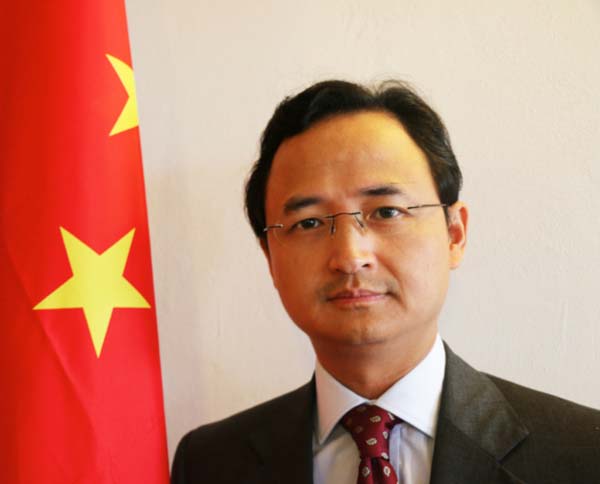
The
annual sessions of the National People’s Congress and Chinese People’s
Political Consultative Conference, known as “Two Sessions”, are one of the most
important events on China’s political calendar every year. What are the key
messages one could get from the recently concluded “Two Sessions” this year?
Firstly,
China will continue to expand opening up.
The
two sessions point the way to improving the strategic blueprint of China’s
opening up, and set the course toward a deeper and higher level of opening up.
China
will push ahead with the Belt and Road Initiative, for example, by accelerating
the building of overland economic corridors and maritime cooperation hubs and
deepening international industrial capacity cooperation. Market accessibility
for foreign investors will improve.
Service industries, manufacturing and mining will be more open to
foreign investment. Foreign-invested firms will be encouraged to be listed and
issue bonds in China, and will be allowed to take part in national science and
technology projects as well. By the end of 2016, China attracted more than 1.77
trillion US dollars of foreign capital. In 2016, China attracted around 118
billion US dollars of foreign investment. More measures have been announced to
attract foreign investment with the promise of easier access and a better
business environment.
“China’s
open door will not close.” President Xi Jinping said at the two sessions that
China will keep on opening up on all fronts, and continue to liberalize and
facilitate trade and investment. President Xi’s remarks echoed his speech at
the World Economic Forum in Davos last January, in which President Xi said
pursuing protectionism is like “locking oneself in a dark room.” I believe, at
a time when isolationism and protectionism are on the rise, China’s openness
will be the benchmark for continued globalization and China’s opening-up policy
has helped solidify its role as a key engine for global growth.
Secondly,
China will carry forward comprehensive reform.
Since
late 1970s, reform has remained a key theme of the country’s development and
nearly 40 years on, the reform drive is now in a deep-water zone -- many of the
easier reforms have been accomplished, leaving difficult tasks. With
breakthroughs made in reforms of major sectors and key links and initial
success achieved in supply-side structural reform in the past year, China will
deepen reform in all areas and move faster to advance fundamental and critical
reforms to boost the internal forces driving development. The heaviest burden
is to be shouldered, and the hardest bones are to be chewed on.
In
2016, 97 key reform tasks were completed, 419 reform plans were made, and
frameworks for reform in major sectors were drawn up to address issues such as
urbanization, poverty alleviation, innovation and the market’s role in resource
allocation. China will continue to transform government functions, reform fiscal
and tax systems, advance reforms in the financial sector, deepen the reform of
SOEs and take more measures to energize the non-public sector. More endeavours
will also be taken to improve IPR
protection system, push for progress in social system reform and deepen
institutional reform to build a sound ecological environment.
Representing
the common aspiration of the entire Chinese people, China’s reform is an ever
ongoing process and key to deciding the fate of contemporary China.
Thirdly,
China will unswervingly endeavour to improve people’s livelihood.
The
well-being of the people is at the center of governance and all government work
is for the people. China will prioritize efforts to ensure and improve the
well-being of our people, spare no effort to deliver more benefits to the
people wherever possible, and ensure that their basic living needs are met.
The
top priority is poverty reduction. In 2016, about 12.4 million Chinese people
shook off poverty. This year, China aims to reduce the number of rural
residents living in poverty by over 10 million, including 3.4 million to be
relocated from inhospitable areas and central government funding for poverty
alleviation will be increased by over 30 percent. China will strive to boost
employment and business startups. China, despite facing daunting challenges,
created 13 million urban jobs and increased per capita disposable income by 6.3
percent in 2016. As Chinese Premier Li Keqiang said during the two sessions,
China will not see nor allow massive unemployment of any societal groups as the
government is capable of ensuring job creation. China will effectively
strengthen environmental protection. Specific measures and goals have been set
to settle environmental issues of public concerns such as tackling smog and
control over exhaust emitted by motor vehicles.
Last
but not least, China commits to building a community of shared future for all
mankind.
China
will remain an important engine for world growth amid sluggish global economic
recovery. In 2016, China’s GDP has exceeded 74 trillion Yuan (about 11 trillion
U.S. dollars), representing a yearly 6.7 percent growth rate, seeing China
topping most other economies and contributing more than 30 percent of global
growth. China’s non-financial outbound direct investment increased 44.1 percent
year-on-year to 170.11 billion U.S. dollars in 2016, and Chinese companies
invested in 7,961 overseas enterprises in 164 countries and regions in the past
year. With solid material foundation, abundant human resources, huge market,
and a complete system of industries, China is ready to face more complicated
and graver situations including sluggish world economic growth and growing
trend of protectionism and has the full confidence and capability to overcome
the difficulties. China’s economy would continue to be the growth engine and
stabilizer of the world economy.
Among
weighing uncertainties, China stands tall for certainty. China will shoulder
its due responsibility. Over the past four decades, China has grown from an outsider
and learner to an insider and contributor of global governance as its overall
strength rises. China-proposed international mechanisms and institutions
provide opportunities for many countries and bring mutual benefits to all
participants. Under the Belt and Road Initiative alone, Chinese companies have
invested 18.5 billion U.S. dollars in 56 economic and trade zones in countries
along the routes, generating 1.1 billion dollars of tax revenue and 180,000
jobs in host countries. During the FOCAC Johannesburg Summit in December 2015,
President Xi put forward ten major China-Africa cooperation plans as
implementation priorities in the next 3 years, and arranged 60 billion dollars
of financial support for this. The plans are being carried out steadily.
China
will contribute to a shared future. Today, mankind has become a close-knit
community of shared future. All countries enjoy the right to development and
pursue it in a broader context instead of at the expense of others. China is
ready to work with the international community to build a new type of
international relations based on cooperation and mutual benefit, and make new
contribution to building a community of shared future for all mankind.
H.E. ZHANG Jiming
Chinese
Ambassador to the Republic of The Gambia



